A few months back, my friend Evi offered to introduce me to some other people who use communications and storytelling for more community-based and social issue related work, since that’s what I feel really called to explore. Thus, I was introduced to Meghan. We shared a bit about our backgrounds, meetup connections, and travel interests via email. It so happens, I was going to be in D.C. in late April, as my weekend of advocacy training concluded, so I hopped a Lyft for the chance to meet my friend’s friend. I’m so glad I had that chance.
Meghan and I got to spend an afternoon walking all around, chatting, checking out a local brewery and making friends with strangers who also seemed to know many of the same places as Meghan, stopping by a market to get ice cream, and getting to know each other. We neglected to take a picture together on that marvelous Sunday afternoon so I’m sharing a cool shot I took, along the way, instead.
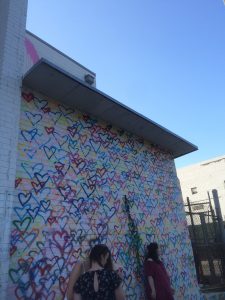
One of the walls near the market we walked to
Meghan’s interest in using education, events, community, and other areas of culture to bring people together was refreshing. We shared some great conversations of how we’d each had our own cultural awakenings, as well. She grew up in Massachusetts before getting a B.S. in Journalism and Spanish at University of Massachusetts. Not too long later, life led her to working in D.C. But, our overlap also met for our love of North Carolina, since Meghan’s family goes to my “hometown” of the Outer Banks every summer. What better place to find a love for storytelling. It’s apparent from Meghan’s work with the U.S. Travel Association, National Geographic, AARP, the Online News Association, and more, that she has a way with connecting people and stories to make information that matters reach people and I’m glad to call her a new friend.
- What did you want to be when you “grew up” and how has that evolved?
I wanted to be a writer. My grandfather nurtured that in me. I mostly wrote fiction when I was very young. (Fun fact: I won a writing contest in first grade for a short story about an anthropomorphic tomato.) I started writing less fiction and more narrative nonfiction as I got older and studied journalism in college. Writing is still the outlet I turn to in my toughest times, like in processing my feelings when my grandfather passed away. - Wow. I’ve never been able to write fiction, but I’ve also taken to writing when in my toughest times. What do you do in your “day job” and why have you chosen that?
I lead an international network of meetup groups for the Online News Association, a community of people who love digital journalism and are passionate about journalism’s role in serving the public. The function of my role is community building, which is fun for me, but I’m also passionate about the outcome, supporting local journalism. Part of my job is traveling to different cities and campuses and talking to journalists there to learn what’s special about journalism and what our community can do to support it. Sometimes it’s just giving journalists a place to connect and talk about digital innovation, and sometimes it’s access to training and resources. Each one is a little different. - I like the sense of giving people a “home” to connect. How did you get into that?
I’ve always been into bringing communities together; in high school swim team I was the captain who organized the spirit events and pasta parties, while my co-captains had the athletic prowess. My first inkling that I could make a living doing community building was at National Geographic, where I saw a powerful opportunity for fans to contribute to our mission. My boss, who was an amazing mentor, helped me carve a niche in community engagement, even though it meant I wouldn’t report to her anymore. (Did I mention she was a fabulous boss?) Then my new boss saw what I was going for and created a runway for me to experiment. I piloted an international photography meetup program, and it sold me on the magic of bringing people together face to face. That kicked off a career at the intersection of community building and journalism. - Nice way to bring it together! What do you enjoy most about your work?
I love being part of a diverse community of people doing cool work in journalism, folks who are constantly innovating and dreaming up new ways to serve their communities’ information needs. From the first ONA event I attended, I knew I had found my people: not only do they get why innovation in journalism is important, but they are doing incredible work. And I get to work with a team that’s smart, excited to experiment with new ideas and passionate about the future of journalism. - Definitely very innovative and insightful. How happy have you been with your choices?
I’m the oldest child, which means for me an obsession with doing everything right and therefore without questioning my choices. This is something I work on:Reminding myself that choices I’ve made in the past had positive and negative outcomes, and that’s a good thing.
Asking myself if I have all the information I need to make the decision. Sometimes, running it by someone I admire. And if the important thing is just that a decision is made, giving myself permission to make it. If anyone reading this has strategies for psyching yourself up for tough decisions, please tell me! - Being open for new strategies definitely indicates you’re a reflective learner. What are your best sources for learning?
I’m a podcast fanatic. It’s a real problem for my phone storage. I look for podcasts that are going to introduce me to a different perspective from my own. Current favorites: Still Processing, Another Round, Nerdette, Sooo Many White Guys, Politically Re-Active, 2 Dope Queens (which often has me laughing like a maniac in public places), How to Be a Girl, Strangers, Beginner, The Mash-Up Americans, Code Switch, Note to Self, Invisibilia. It’s also important to me to consume fiction, and for that in podcasting I recommend The Truth and Limetown. - I need to dig into that. What obstacles for women have you observed?
Not having a seat at the table. Especially in my industry, it’s critical to have diverse people in leadership and decisionmaking roles. There are a number of communities doing important work in mentorship and networking for women, people of color, the LGBTQ community, people from different socioeconomic and geographic backgrounds and more to the table, and there’s a lot of work to be done. - What do you devote your time to outside of “work?”
For the past six years, I’ve been involved with an English as a Second Language program for adults, as a teacher and program coordinator. It’s a free, volunteer-run community resource for our neighbors from around the world to practice their English skills. I’ve met inspiring people and dear friends from all over the world in both the students and the teachers. They show up every week just for a love of the community and learning, and that inspires me. I love recruiting and training teachers – especially people who think they can’t do it (you can!) – so I wrote this piece a couple of years ago to explain why I do it. - Very encouraging. Who do you look up to?
My mom. She’s had a number of different careers based on what was the right thing for her at the right time: in her 20s she was in finance and taught fitness classes. When she had kids, she opened a childcare business. A few years ago, she studied to be a real estate agent specializing in older and antique homes, another passion of hers. Her story helps me steady myself in moments of doubt: What works for me right now may be different down the road, and I’ll find my way there.
- What are you most proud of?
I’m most proud of my three siblings. Each of them is carving her- or himself a special path in the world and brings something unique to the family. They’re also all three brilliant and funny. - Best and worst advice you’ve ever received?
Not sure about the worst, but I’ll tell you about the best: Studying abroad when I was 20 was my first extended time away from my family and outside the U.S., and I was miserable for the first two weeks. I was crying to my mom on the phone one afternoon when my grandparents walked in, and my grandmother got on the phone. She told me a story about when she moved to the U.S. at age 19, right after getting married. Her new husband picked her up in his family’s car and took her straight to meet his family. She was so nervous she couldn’t walk into the house — and she couldn’t just phone up her mother, of course. That day she learned her best advice:
If you can put on a confident face, the real confidence follows.
Meghan has a really cool website with a tendency to also post cool and interesting things on her Facebook, Instagram, and Twitter, all under @mmurphydc. Be sure to connect with her on LinkedIn too. She’s a good person to know.
Thanks for reading Meghan’s story. Share in the comments how it impacted you or share it on social media. Check out next week’s weekly post on Women & the Ways We Work. Missed the others? Take a look at my blog to read the others. Know someone you think should be featured? Can I help you or your organization with a storytelling project? Contact me and let’s chat.

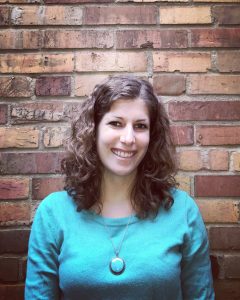
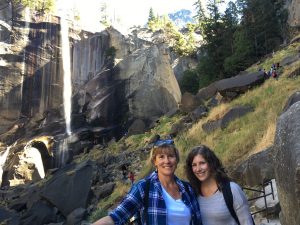
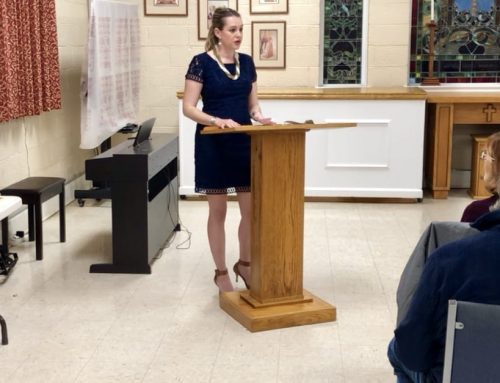
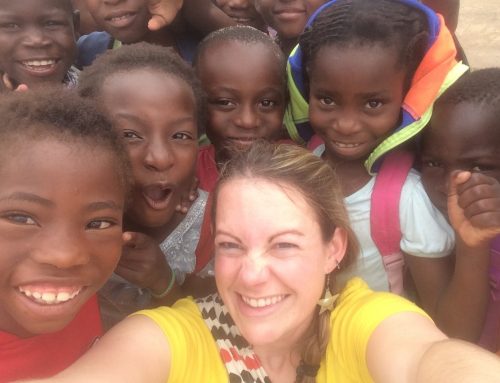
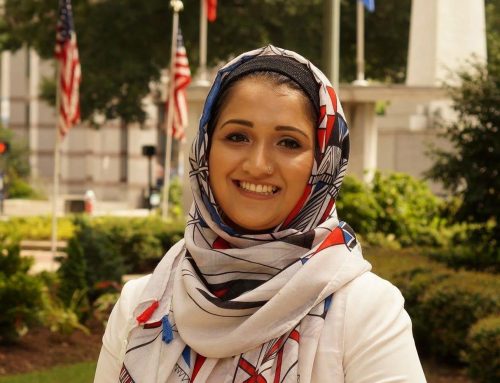
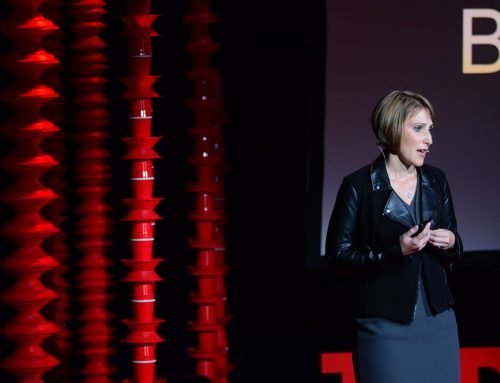
Leave A Comment
You must be logged in to post a comment.